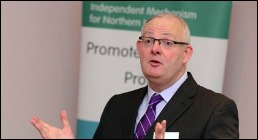
17/09/2014
New research from the Equality Commission on the policy gaps affecting people with disabilities has been launched. Read Commissioner Murray Watt's speech or go straight to the
research summary or
full report (pdfs).
Speech by Murray Watt, UNCRPD research launch, Stormont Hotel: 17 September 2014
Life is tough enough for most of us, but for people with disabilities, there's a multitude of additional challenges. Every year, the Commission gets more complaints about disability discrimination than on any other ground.
To be disabled in our society usually means you're going to be underemployed, have less access to money, less access to education, less access to the ability to take part in our society as a politician or leader. There are issues with the system, and there are often added costs for people with disabilities to do what the rest of society takes for granted.
Disability is a big issue for society, and so it’s a big issue for the Commission. I am one of two commissioners working, along with our colleagues from the NI Human Rights Commission, specifically on the United Nations Convention on the Rights of Persons with Disabilities, the UNCRPD.
Together we form the Independent Mechanism for Northern Ireland which exists to promote, protect and monitor implementation of the UNCRPD. It will be our responsibility to look at how the UNCRPD is being implemented in Northern Ireland, and report on this to the UN Committee.
One of the ways we have been doing this is to commission research (such as today’s) that helps us identify the policy obstacles and issues that prevent disabled people playing a full part in our society.
We use this evidence alongside information and experiences gathered from disabled people on their perception of the barriers and gaps facing them.
We’ve also worked closely with the Equality and Human Rights Commission and the Scottish Human Rights Commission as part of the UK Independent Mechanism to develop a draft submission on the ‘List of Issues’ to the CRPD Committee on Convention implementation across the UK. This will form the backbone of our contribution on what we’ve found in terms of governmental compliance with the UNCRPD.
So, turning to today and this new research that we’re discussing today – this work follows on from our 2012 research publication, ‘How does Northern Ireland measure up?’ It looks at the policy obstacles I mentioned, to pinpoint systemic issues that can routinely exclude people with disabilities from realizing their full potential and playing a full part in our society.
We commissioned this new research from the team at Queen’s University, Belfast, to update that 2012 Report on the regional situation and to contribute to the evidence base that the Independent Mechanism is using in its engagement with the examination of the UK by the United Nations Committee in 2014 and 2015. We have already used the initial findings of the research in a working paper, which we used in July this year to inform the Northern Ireland Parallel Jurisdictional Report.
As you’ll hear shortly from Paul Noonan, not a great deal has changed. The areas in which the 2012 research found gaps in policy still by and large exist.
Paul will outline for you some of the work that we have done to engage with disabled people, with organizations and with NGOs to help both gather information and to encourage and support other bodies to develop their own shadow reports on the implementation of the UNCRPD.
Then Professor Byrne and her team will discuss their findings and we will have a chance to ask questions of them.
Our aim through all UNCRPD is to ensure that there is a consistent, inclusive and joined-up approach within Government for assessing the impact of new and revised policies on equality of opportunity for disabled people.
Our role at this stage is to help government departments ensure they are meeting their obligations under UNCRPD and will mean that ministers have better information and analysis, and will make better informed and more inclusive decisions. We need policy makers to listen and to act on the shortcomings that are disadvantaging disabled people.
Thank you and I now hand you over to Paul Noonan, senior policy officer with the Equality Commission to place the research in context.